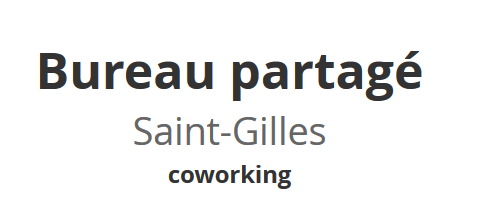Choosing where to base your business or company might seem insignificant but it can play a vital role in your motivation and can have an influence on the success of your project. What do you need to consider when choosing where to work? Do you need to share a space with others? How can you work out which option suits you best: working from home, co-working, closed/semi-closed office, or something else?
Who is offering workspaces in Brussels?
- Business centres have a wide range of spaces to rent.
- Co-working spaces rent workspaces, including open plan offices to share, as well as offices, meeting rooms and so on.
- Incubators – structures associated with a university or college – host innovative start-ups (in the scientific research sector) and allow them to work there.
- Some companies in the private sector offer offices for rent.
- Business cooperatives are specifically designed for jobseekers who have a business idea and need supervision to prepare and test out their business. They also have pleasant workspaces for people accepted into the cooperative.
- Individuals meet at someone’s home to work. This concept is known as co-homing.
What type of space?
CLOSED OFFICE
This type of office is not only available in private companies. Various co-working spaces, incubators and business centres have separate spaces to offer privacy to minimise distractions and ensure secrecy and confidentiality. Having your very own office is undoubtedly calmer and quieter. It also means you can personalise your workspace. It's like working from home but with fewer distractions! Renting a real office is often suitable for self-employed people who need to meet clients in a location that looks professional. This kind of office also offers more privacy, either for meetings or for protecting new ideas. Options are often flexible, payable monthly, and services are personalised depending on your needs.
RENTING A WORK STATION or SHARED OFFICES IN CO-WORKING SPACES, BUSINESS CENTRES OR INCUBATORS.
These shared workspaces offer a more convivial working environment, encourage people to support one another and share experiences, and enable them to create or develop a professional network. They are often less expensive than separate offices, offer a range of membership options and enable users to access essential office equipment, including desks, internet, printer, video projectors, and so on.
Depending on their wants and needs, business owners can take advantage of support from professional advisers and coaches, especially in the areas of business creation and management, business modelling, technological development, legal matters, management and other areas depending on the sector in question.
They offer many attractive and tried-and-tested benefits. Bear in mind that some people take longer than others to find their bearings and get used to the interpersonal dynamics and logistics of a new workspace. It is also normal for a shared workspace to be less customisable than your home office and a level of tidiness is needed.
A SEMI-CLOSED WORKSPACE
Why not opt for a happy medium? Find out about the layout of the office in advance if you are sensitive to noise. Some shared spaces may have partition screens or green walls to give you some privacy, which might be suitable for those who need a quiet space within a shared environment. In some cases, there are also spaces specifically designated for making phone calls.
FROM HOME
Starting up your business in the place you live enables you to significantly reduce the financial burden of renting or buying office space/premises. You can benefit from this option in a number of ways: no commuting time, freedom to choose your working hours and lower costs. If you rent your home, make sure you get permission from the owner of the property before starting to operate your business there, and check in your tenancy contract whether a percentage of your rent is tax-deductible based on the amount of space used for business purposes.
Be warned: working from home also has its drawbacks. Motivation and productivity can suffer when you work at home on your own. It is also possible that your business will need to comply with planning regulations. Since residential properties are protected, the ability of carrying out professional business from home is limited. This is only possible for some self-employed or non-commercial professions, such as lawyers, notaries, doctors, architects, consultants, accountants, real estate experts, psychologists, tax advisers, etc. (information about this type of business is available in this article (FR)) and there are certain limitations regarding the surface area which can be designated for business purposes. Read this article for more comprehensive information on the matter.
Unfortunately for tenants, many rental contracts do not allow any part of the rent to be tax-deductible because this has an impact on the taxation of the owners.
AT ANOTHER PERSON'S HOME (CO-HOMING)
This option is often cosier and more comfortable that more traditional workspaces. It’s a place where you can feel at home (providing you have the same tastes). As well as providing a pleasant working atmosphere, it can also encourage small group collaboration and means that you don’t need to commit to memberships lasting several months.
Make sure you check that it has the equipment you need (printers, etc.) and that the working day doesn’t turn into a day out with friends.
Selection criteria
Depending on your business, it is a good idea to list your criteria by order of importance. Some examples:
- Location: accessibility with regard to suppliers, clients, parking nearby, access via public transport
- Image: the district, building, visibility
- Atmosphere: is your sector more suited to an official setting or a more relaxed environment?
- Sector: some co-working spaces specialise in a certain sector. E.g.: Creatis for the artistic sector, the BLSI incubator for companies carrying out research in the human health sector, Betacowork for the digital sector, etc.
- Costs: costs for co-workers vary. You need to allow for between €200 and €500 per month per work station on average, depending on the location and services chosen.
- Subsidy: if you have a business proposal or your business is less than three years old, you could benefit from a grant of up to €450 towards your membership of a co-working space approved by the Region (FR)!
For more inspiration on the most important criteria for you, visit this 1819 web page.
Reasearching and inquiring
- On the 1819 website (“Who can help me? - location”) you will find a directory of co-working spaces, incubators and business centres in Brussels. There are over 97 different locations!
- The website of the incubators in Brussels (BLSI, EEBIC, ICAB and Greenbizz, the details of which can also be found in the “Who can help me?” tab)
- You can also search for business centres on the following websites: www.centres-d-affaires.be, www.belgianworkspaceassociation.be, www.matchoffice.be or if you just need a few hours: www.mobispot.be
- The database Inventimmo (of CityDev - responsible for the urban development of the Brussels region) features on its website the professional workspaces available as well as warehouses, industrial premises and unoccupied offices, and current availability in business centres. This can be consulted online free of charge.
- The website www.occupationtemporaire.brussels is attempting to list all the unoccupied workspaces in Brussels and to help owners and people looking to launch temporary initiatives find each other.
- The Newton II site in Anderlecht has workshops for craftspeople (carpentry, ironwork, etc.) to carry out their business.
- Other private initiatives which could help you in your research or give you some inspiration: https://co-homing.net/fr/ (co-homing), https://www.chooseandwork.be/fr/ (search engine for offices to rent in private companies), www.thehorizonresidence.be (accommodation and workspaces at the same address), www.bird-office.com (search engine for meeting rooms to rent), Workero (office rental in companies and associated co-working spaces).
- You can also use an estate agent or specialist website.
Important points
REGISTERED OFFICE AND PLACE OF BUSINESS
When you set yourself up as self-employed, you need to choose a registered office, which is the legal address of your business. You can also have a place of business, which is the location where the business is actually carried out. The registered office and place of business are sometimes the same address, but not always. A tradesperson can give their home address as the registered office of their business while working in their store, located at a different address.
Can you give the address of a business centre or co-working space as your registered office address? Yes, in most cases. Indeed, this service is frequently included in service packages, which gives you a professional address at the place you work.
Beware of using a fraudulent registered office address: renting a workspace in a co-working office/business centre in Brussels in order to obtain a grant from the Region is not an option. The Region pays close attention to such activities and can check whether you are actually working at the address provided if you request a grant.
What are the different rental agreements ?
Who can help me ?






